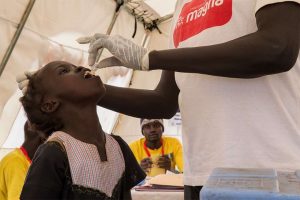May 2017: The World Health Organization (WHO) has released several reports on efforts to implement health-related SDGs and targets, improve data on cause of death, and combat adolescent obesity in Europe and high mortality rates in adolescents. Bhutan became the first country in Southeast Asia to implement the WHO’s package of essential interventions for non-communicable diseases in low-resource settings.
A report on ‘Progress in the implementation of the 2030 Agenda for Sustainable Development’ was issued for consideration during the 70th meeting of the World Health Assembly (WHA), convening in Geneva, Switzerland, from 22-31 May 2017. The report highlights engagement between 60 WHO country offices and the respective governments to align national health policies, strategies and plans with the SDGs, following on the WHA’s resolution on health in the 2030 Agenda (WHA69.11).
The report also outlines global and regional progress made by WHO member states in implementing SDG 3 (good health and well-being) and health-related targets. The report underscores challenges related to reducing maternal and child mortality and improving health (SDG targets 3.1 and 3.2); improving nutrition (SDG target 2.2); and combating infectious diseases (SDG target 3.3) and NCDs (SDG target 3.4) and their risk factors. It also addresses sexual and reproductive health services (SDG target 3.7) and universal health coverage (SDG 3.8). According to the report, weak health systems are an obstacle to achievement in some of these areas, as they can create “deficiencies in coverage for even the most basic health services and inadequate preparedness for health emergencies.”
While the number of deaths with reported causes has increased, more than half lack complete or correct information, according to the WHO’s report titled ‘World Health Statistics 2017: Monitoring Health for the SDGs.’ Collecting such data is crucial to monitor progress towards SDG 3 and other Goals, the report says, but many countries still do not collect adequate data to monitor health-related SDG indicators and targets. The report notes, however, that where such information is collected, health coverage has improved, particularly regarding HIV treatment and nets to prevent malaria. In addition, China, Turkey and Iraq, in particular, are now recording 90% of deaths with cause-of-death information, compared to only 5% in 1999.
The WHO also published two reports on adolescent health. ‘Global Accelerated Action for the Health of Adolescents (AA-HA!): Guidance to support country implementation’ explains that 1.2 million adolescents die annually, with road traffic injuries, lower respiratory infections and suicide the biggest causes of death. Most of the deaths would be preventable with quality health services, education and social support systems, the authors argue.
The WHO also highlights how causes of adolescents’ death differ by age and sex. According to a fact sheet, complications from pregnancy and childbirth are the leading cause of death globally for girls aged 15-19 years old. SDG target 3.7 addresses this by aiming to, by 2030, “ensure universal access to sexual and reproductive health-care services, including for family planning, information and education, and the integration of reproductive health into national strategies and programmes.”
Another health risk is HIV, with which more than two million adolescents live. SDG target 3.3 addresses this by aiming to, by 2030, end the AIDS epidemic and other communicable diseases. The WHO underscores that countries must focus on adolescents in their HIV control efforts, including by making available condoms, clean needles and syringes for drug users, and HIV testing and counseling.
The other report describes an increase in the number of obese adolescents in European countries, with one in three estimated to be overweight or obese, particularly in southern European and Mediterranean countries. Titled ‘Adolescent obesity and related behaviors: trends and inequalities in the WHO European Region, 2002–2014,’ the report was released at the European Congress on Obesity, which convened from 17-20 May 2017, in Porto, Portugal. Zsuzsanna Jakab, WHO, called for “ambitious action” to achieve SDG target 3.4 on stopping the increase in childhood obesity, one of the most serious public health challenges globally, according to the report, with one in ten adolescents aged five to 17 overweight or obese, 80% of which continue to have weight problems as adults.
Bhutan has implemented a national plan that links all sectors in order to prevent and control NCDs, and is the first country in Southeast Asia to implement WHO PEN, the WHO’s package of essential NCD interventions for primary health care in low-resource settings. NCDs cause over half of all deaths in Bhutan, according to WHO, including among monks who follow diets that are heavy in salt, sugar and fats, all of which lead to obesity, hypertension and diabetes. Until recently, people in remote villages were unable to access medicines.
In 2018, Bhutan will introduce its five-year socioeconomic plan, which prioritizes NCD prevention and control. According to the WHO, Bhutan can also serve as a model for others regarding its work on heart disease prevention and control. The WHO is providing Bhutan with integrated support to fast-track progress on achieving the SDG targets related to NCDs, including SDG target 3.4 on reducing premature death from NCDs by one third through prevention and treatment. [Progress in the Implementation of the 2030 Agenda for Sustainable Development] [NGOs beyond 2014 Article on WHO Report] [UN News Story on Reported Causes of Death] [World Health Statistics 2017] [Global Accelerated Action for the Health of Adolescents (AA-HA!): Guidance to support country implementation] [WHO Press Release on AA-HA Report] [Fact Sheet on Adolescent Health Risks] [UN Press Release on Adolescent Obesity] [HSBC Website] [24th European Conference on Obesity Website] [Adolescent obesity and related behaviors: trends and inequalities in the WHO European Region, 2002–2014] [WHO Press Release on Bhutan Plan] [WHO PEN Website] [UN Task Force on NCDs in Bhutan]

